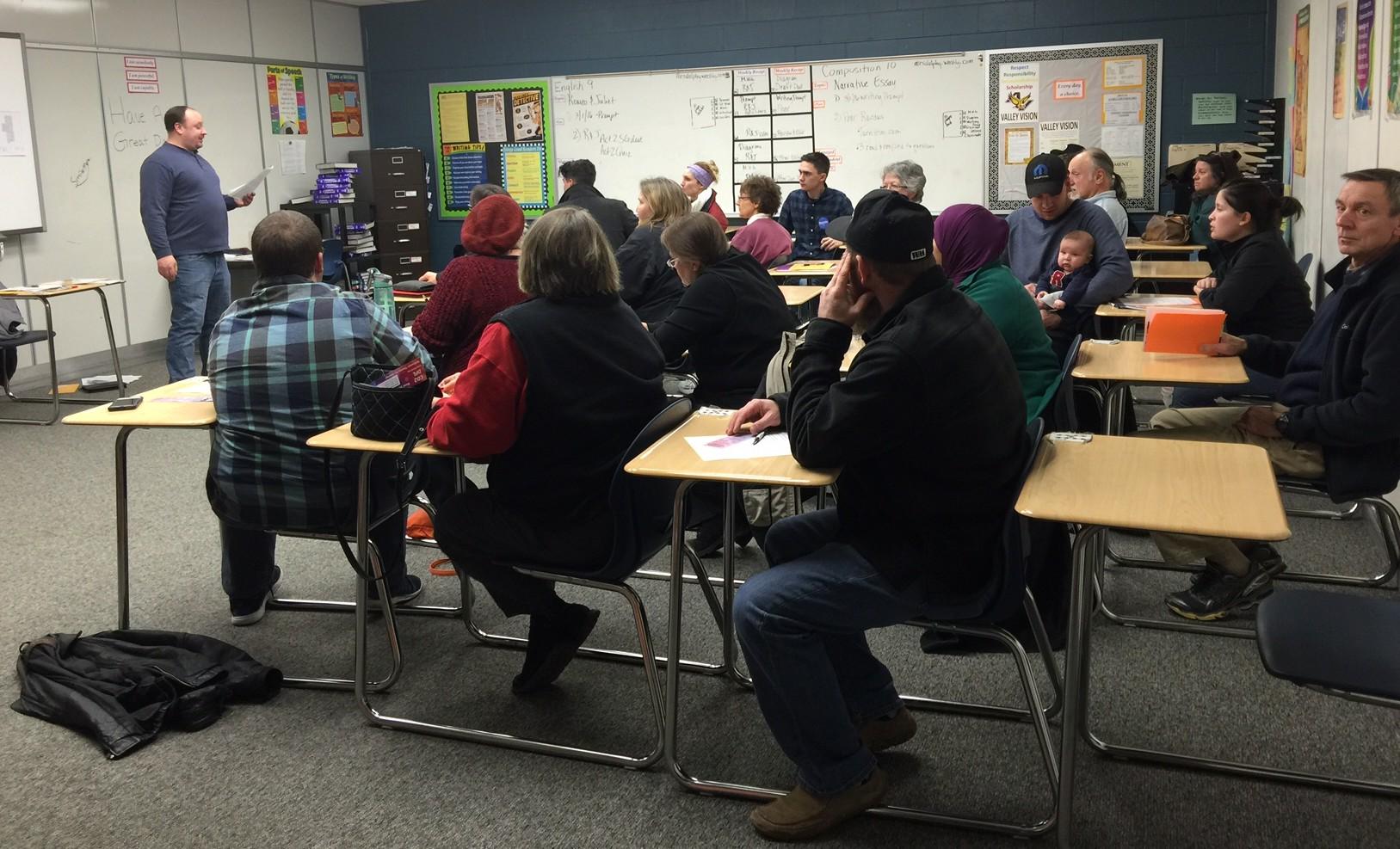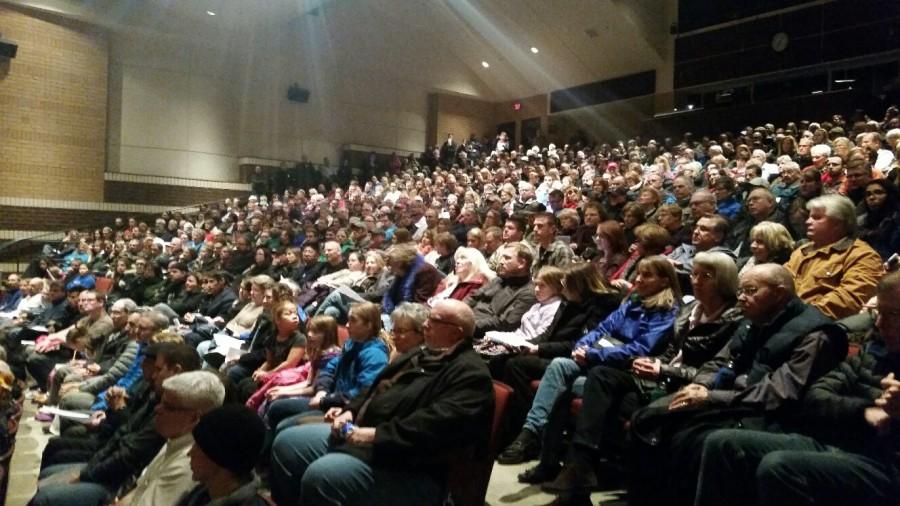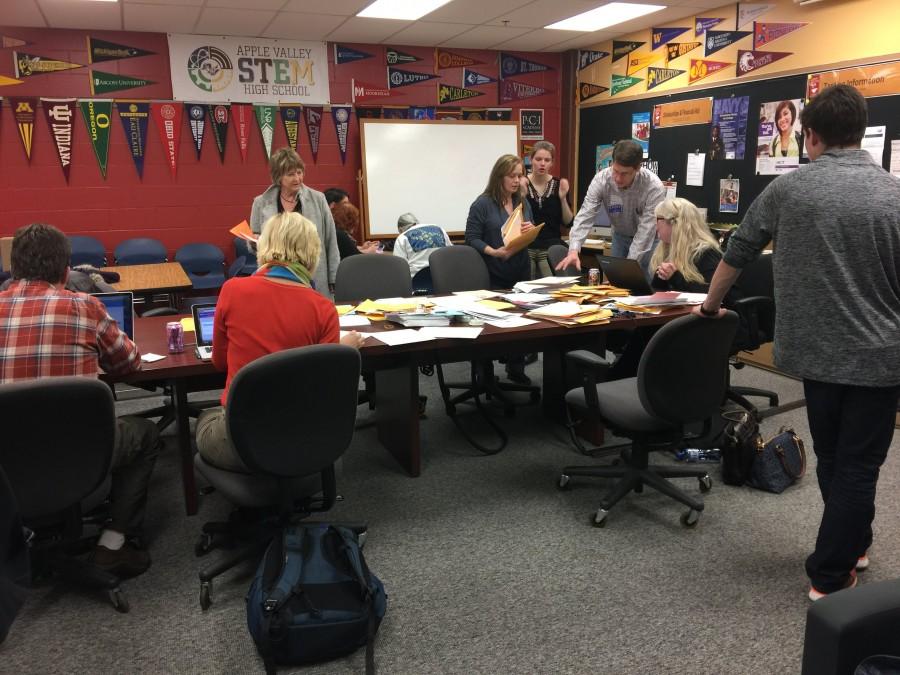Minnesota Caucuses 2016: Super Cool Super Tuesday
March 7, 2016
Varied outspoken candidates have been captivating the media’s attention since last year, making the 2016 presidential race one of the most exciting campaigns in history. Senate District 57 was no different on Super Tuesday, the day on which the most states have their caucuses or primaries. Senate District 57 contains precincts for Apple Valley, Rosemount and Lakeville residents. These residents caucused in a big way on March 1st.
Most people know that for the general presidential election, there is one candidate representing each political party. But how does this one candidate get chosen to represent the party? The answer is simple: caucuses.
The caucus process in not as simple as its intentions, however. Caucuses are crucially important in deciding the next president, and largely provide insight to voter tendencies as a whole. Districts like Senate District 57 are critical to this caucus process.
States are divided up into Senate and House Districts, often times spanning multiple cities. Within this relatively large district, precincts are assigned based on voters’ home addresses. District 57 residents receive their precinct assignments and addresses for caucus sites depending on their political alignment.
Each political party in each district has a certain number of delegates to send to the state convention, who will vote there for a presidential nominee. Then, some delegates will continue on to the national convention, where the Democratic and Republican parties will officially select their presidential nominees for the 2016 election.
Large crowd of voters in the general meeting for the Republican caucus.
Republican Caucus – District 57
Turnout within the Republican Party this cycle has been extraordinary. Because of this, District 57 had two Republican caucus locations: Rosemount High School and Eastview High School. Caucus locations were then assigned depending on precincts. According to the districts’s Republican website, 2195 Republican voters turned out, over four times as many as in the 2008 caucuses.
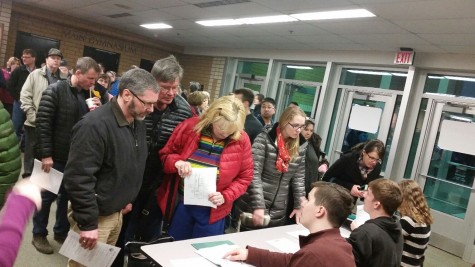
Voters wait in line to verify precinct assignments
Eastview High School experienced this phenomenon of large voter turnout on caucus night. According to Kevin Ecker, Senate District 57 Secretary and Caucus Coordinator, they were anticipating 2,000 attendees on Tuesday night. They significantly underestimated this figure. By night’s end, Ecker estimated 4,000 attendees showing up to support local and national candidates.
This large turnout in District 57 can be credited to the vast range of candidates. Not only were the national presidential candidates represented by their delegates, but local candidates were also present.
Tara Mack, looking for reelection to the Minnesota House of Representatives, showed up with many supporters. In an interview with Mack, she wanted to let young voters know to pay close attention during this election season because the decisions made by these candidates will affect them for years to come. She thinks that the younger generations’ financial future is in the hands of these candidates.
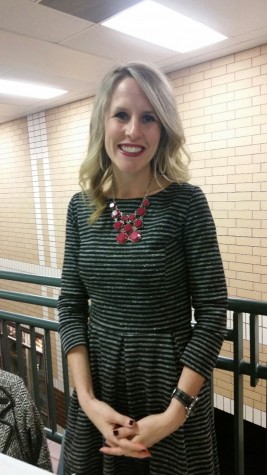
Candidate Tara Mack
Local candidate Cory Campbell also made an appearance at District 57’s Caucus for support in his campaign for State Senate. In an interview, he wanted to let young voters know that if they gave him their support, he would prevent the government from being intrusive. He credited this goal as a result from Obamacare, which caused Campbell’s insurance company to go out of business.
These local candidates were likely not the reason for the large turnout, however; the main event of the night was the voting for national candidates that took place after the general meeting. When voters arrived, they were instructed to attend the general meeting to hear local candidates’ statements for support. In District 57, there was such a large turnout that not all of them could fit into the auditorium. After caucus goers heard statements from these local candidates, they divided into rooms based on their precinct to vote.
In these precinct rooms, the voters cast their votes on ballots. According to Caucus Coordinator Ecker, the majority of the 13 precinct rooms ran out of ballots due to the historic turnout of voters.
As the large turnout seemed to be the headline of the night for Senate District 57’s Republican Party, the results of Minnesota’s caucus as a whole quickly became a national headline. Marco Rubio won District 57 and the state, earning 17 delegates in his quest to become the GOP’s nominee for the general election. This is Rubio’s first win in the caucus season and the only state not won by Donald Trump or Ted Cruz on Super Tuesday.
Across all states that had caucuses on Super Tuesday, Trump won 7 (AL, AR, GA, MA, TN, VT, VA), Cruz won 3 (AK, OK, TX), and Rubio won 1 (MN).
It is safe to say that Senate District 57’s Republican voter turnout and Minnesota’s caucuses as a whole made Super Tuesday one for the record books.
AVHS Career Center, where presidential ballots from precinct rooms were counted.
Democratic Caucus – District 57
On Super Tuesday, over 2400 democrat residents of Senate District 57 came out to Apple Valley High School. Lines to enter the school were out the front doors and far down the sidewalk. Some people had to wait over an hour to get in.
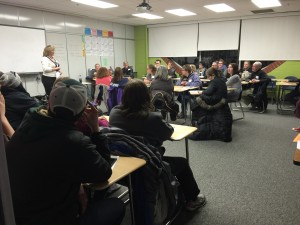
A precinct room where residents cast their presidential preference ballots and discuss additions to party platform
What was all the hubbub about? The 2016 Minnesota presidential caucuses. In this caucus, residents of a district can select who they want their delegates to vote for to receive the DFL (Democratic Farmer Labor) party nomination. The big contest this year for the Democratic party is between Hillary Clinton and Bernie Sanders for the presidential nomination.
Many readers of The Talon are going to be able to vote in this year’s presidential election. Some even went out to participate in their caucus. Most have heard about Clinton and Sanders, but several local candidates were also present on Tuesday. However, local candidates are also often the least-known to high schoolers. I asked candidates and their representatives, “Why should an 18-year-old go out and vote for you (or the candidate you’re supporting) in the next election?”
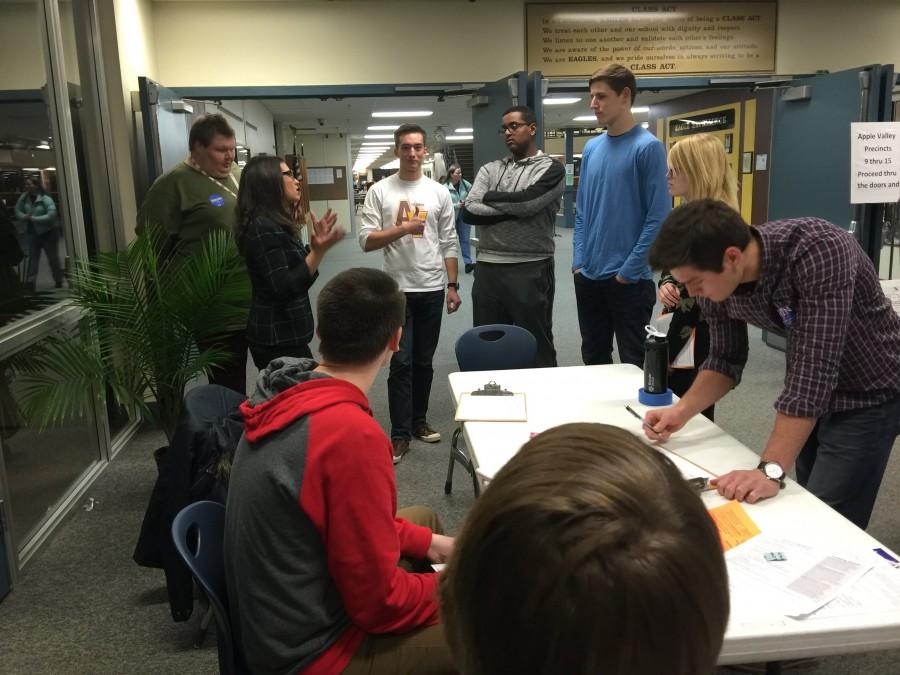
Erin Maye Quade speaking to student volunteers at AVHS
Paul Chellsen (Bernie volunteer): Bernie is the one candidate who has rejected big money. If you look at the money he’s taken in, the average donation is twenty bucks. To raise as much money as the other guys, twenty bucks a pop, means he has grassroots support. There’s a reason that every kid under 25 I run into seems to be going for Bernie. It’s the student loan issue, which they realize firsthand is going to affect them. I think the other part of it is, he gives people hope. People also always ask about the military and veterans; what can he do for them? What he’s done for them is he’s voted against the war. If you support the veterans, you don’t want to make any more veterans- you want to take care of the ones you have, which he’s done. He’s the only person running for office that voted against the war. At the end of the day, we’re all going to come together hopefully and put a democrat in the White House.
Daran Han (Hillary volunteer): If you think about what’s happening in politics right now, the divisiveness in opinion and thought, especially between the Democratic Party and the Republican Party, I think you should vote for Hillary because she’s a candidate that can go in and get the job done. With all of her experience, she’s ready to be Commander in Chief.
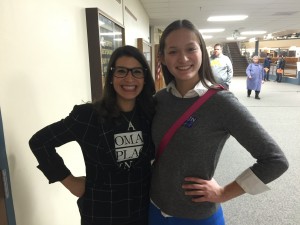
Me and Erin Maye Quade
Erin Maye Quade, State House Representative candidate (District 57A): “I encompass a lot of minorities. I’m young, gay, black, and a woman. I was 18 a lot more recently than the people who are in the House right now. When I went to college in 2004, they told me to go to the best college and take out a lot of loans. Then, my econ teacher said, ‘You guys will have the worst economic conditions when you graduate.’ I didn’t want to be told about it, I wanted solutions. I’m more in your generation than the generation of the legislators I’ll be joining. We have a unique voice as a generation and it’s not there in the legislation.”
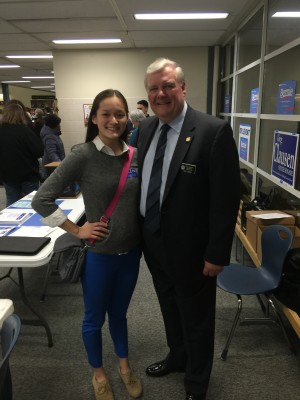
Me and Senator Greg Clausen
State Senator Greg Clausen: “I’ve done a lot of work on education issues. Students were overburdened with debt; we’ve got the fifth highest percentage of students carrying debt. And that means you can’t buy the first house or the new car, or maybe you’re putting off getting married. By refinancing student loans, maybe some of that can happen. I’ve been a big champion of concurrent enrollment, so students can earn college credit while they’re in high school. I’m very proud of my Paul Wellstone Award for Mental Health. I’ve done a lot of work on mental health. All-day kindergarten was also my deal. I’ve really enjoyed my time in the senate and I hope I’ve earned the trust and support of the people.”
Angie Craig volunteer: Angie’s number one platform is education. She’s kind of the epitome of the American Dream. She was actually raised in a trailer park in Arkansas, and then through working two different jobs she ended up sending herself to the University of Memphis, and then became a business executive at St. Jude medical. But the thing is, working two jobs, who can do that anymore? Who can finance themselves to college without taking student loans? That just doesn’t exist anymore. So, her platforms are providing funding for public education, special education, and just encouraging public colleges to lower their costs because we should all be able to go to college and pursue that American Dream. John Klein is retiring from our district’s congressional seat, so it’s a really good opportunity to turn it blue and elect a powerful woman to office and really change the face of power.
John Huot, State House Representative candidate (District 57B): I would imagine their biggest concern is education beyond high school. So one of my focuses will definitely be to look at those opportunities as far as their debt load they’re looking at. There’s gonna be a lot of jobs available to them, so we need to make sure they are successful and able to get into those positions. So keeping the debt load down is one of my major goals. I have a son who just graduated from Rosemount High School, so it’s the same situation in our family.
206,078 people participated in the democratic caucus in Minnesota last Tuesday, making it the second highest turnout of all time. After all was said and done, Bernie Sanders won every district in the state of Minnesota, ending up with approximately 62% support, while Clinton had about 38%. Out of Minnesota’s 77 delegates to the national convention, Sanders will receive 46 and Clinton will receive 31.
